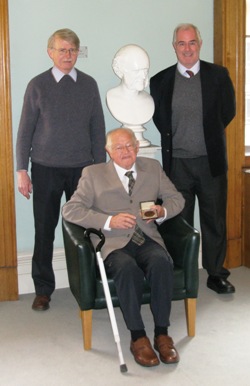John Baird Simpson
In February, the Library and Archives were presented with the Lyell Medal awarded to John Baird Simpson in 1954. Archivist Caroline Lam* reports.
 Picture: Simpson’s son Dr Morven Simpson and grandchildren Dr Graeme Simpson and Colin McKenzie made the presentation, fittingly, beside the bust of Sir Charles Lyell (l-r: Colin McKenzie, Morven Simpson (seated), Graeme Simpson). Photo: Wendy Cawthorne.
Picture: Simpson’s son Dr Morven Simpson and grandchildren Dr Graeme Simpson and Colin McKenzie made the presentation, fittingly, beside the bust of Sir Charles Lyell (l-r: Colin McKenzie, Morven Simpson (seated), Graeme Simpson). Photo: Wendy Cawthorne.
John Baird Simpson (1894-1960) was born in Glenferness, Nairnshire in Scotland, and studied for a BSc in Agriculture at the University of Aberdeen. On graduation in 1914, he enlisted in the Royal Engineers and was later commissioned into the Gordon Highlanders, but during service in France was wounded and badly gassed.
Returning to civilian life in 1918, Simpson resumed his studies at the University, finally leaving in 1920 with a BSc in Pure Science with special distinction in Geology. Later that same year he was appointed to the field staff of the Geological Survey in Scotland. He was promoted Senior Geologist in 1932 and then District Geologist in 1945. During his time with the Survey, Simpson was a major contributor to the mapping of the Western Highlands and Islands of Scotland, including the Lewisian of Coll and Tiree, the Mesozoic sediments and Tertiary lavas of Morven and on the Moine Schists of both Morven and Arisaig. Additionally, his detailed investigations around Ayrshire, Dumfriesshire and East Lothian provided invaluable data for the re-appraisal of Scottish coalfield reserves.
Outside of his Survey work, Simpson studied the effects of glaciation in Scotland and became the leading authority on fossil pollen. He attributed his upbringing in rural Scotland as first sparking his interest in geology: “As a boy it was my good fortune to have to cycle to and from school through a mile-long glacial channel which, even to my then untutored eye, could hardly be other than an ancient watercourse, although now devoid of water and lacking an orthodox head. These very perplexities, however, made it my problem, and wrestling with it gave my mind a geological slant and stimulated the reading of geological works. So when years later the true nature of this channel was revealed to me in the crystal-clear lectures of Professor Gibb at Aberdeen, it seemed natural that glacial channels and kindred paths should henceforth be my chosen way through life”.
Simpson received many honours throughout his career. In 1932 he was elected Fellow of the Royal Society of Edinburgh, the following year the University of Aberdeen awarded him the degree of DSc and he was awarded the Clough Medal by the Edinburgh Geological Society for the period 1953-1954. The Lyell Medal was presented to Simpson in 1954 on his retirement from the Survey, in recognition of his contributions to geology. Simpson’s enthusiasm for geology was passed down to his son Morven and grandson Graeme Simpson, both of whom followed in his footsteps by becoming Fellows of the Society.
*
www.geolsoc.org.uk/archives